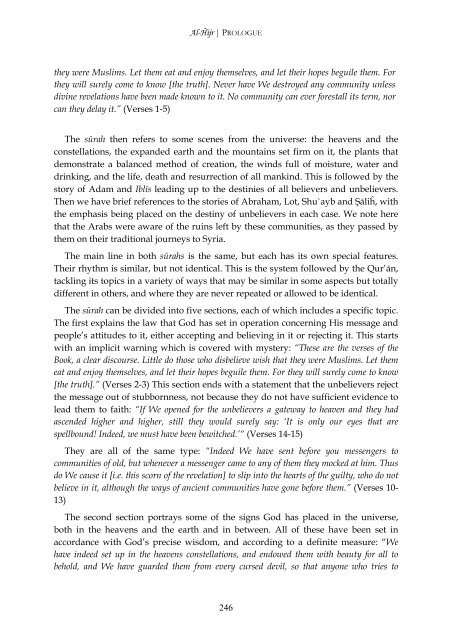Volume 10 Surah 12 - 15 - Enjoy Islam
Volume 10 Surah 12 - 15 - Enjoy Islam
Volume 10 Surah 12 - 15 - Enjoy Islam
You also want an ePaper? Increase the reach of your titles
YUMPU automatically turns print PDFs into web optimized ePapers that Google loves.
Al-Ĥijr | PROLOGUE<br />
they were Muslims. Let them eat and enjoy themselves, and let their hopes beguile them. For<br />
they will surely come to know [the truth]. Never have We destroyed any community unless<br />
divine revelations have been made known to it. No community can ever forestall its term, nor<br />
can they delay it.” (Verses 1-5)<br />
The sūrah then refers to some scenes from the universe: the heavens and the<br />
constellations, the expanded earth and the mountains set firm on it, the plants that<br />
demonstrate a balanced method of creation, the winds full of moisture, water and<br />
drinking, and the life, death and resurrection of all mankind. This is followed by the<br />
story of Adam and Iblīs leading up to the destinies of all believers and unbelievers.<br />
Then we have brief references to the stories of Abraham, Lot, Shu`ayb and Şāliĥ, with<br />
the emphasis being placed on the destiny of unbelievers in each case. We note here<br />
that the Arabs were aware of the ruins left by these communities, as they passed by<br />
them on their traditional journeys to Syria.<br />
The main line in both sūrahs is the same, but each has its own special features.<br />
Their rhythm is similar, but not identical. This is the system followed by the Qur’ān,<br />
tackling its topics in a variety of ways that may be similar in some aspects but totally<br />
different in others, and where they are never repeated or allowed to be identical.<br />
The sūrah can be divided into five sections, each of which includes a specific topic.<br />
The first explains the law that God has set in operation concerning His message and<br />
people’s attitudes to it, either accepting and believing in it or rejecting it. This starts<br />
with an implicit warning which is covered with mystery: “These are the verses of the<br />
Book, a clear discourse. Little do those who disbelieve wish that they were Muslims. Let them<br />
eat and enjoy themselves, and let their hopes beguile them. For they will surely come to know<br />
[the truth].” (Verses 2-3) This section ends with a statement that the unbelievers reject<br />
the message out of stubbornness, not because they do not have sufficient evidence to<br />
lead them to faith: “If We opened for the unbelievers a gateway to heaven and they had<br />
ascended higher and higher, still they would surely say: ‘It is only our eyes that are<br />
spellbound! Indeed, we must have been bewitched.’“ (Verses 14-<strong>15</strong>)<br />
They are all of the same type: “Indeed We have sent before you messengers to<br />
communities of old, but whenever a messenger came to any of them they mocked at him. Thus<br />
do We cause it [i.e. this scorn of the revelation] to slip into the hearts of the guilty, who do not<br />
believe in it, although the ways of ancient communities have gone before them.” (Verses <strong>10</strong>-<br />
13)<br />
The second section portrays some of the signs God has placed in the universe,<br />
both in the heavens and the earth and in between. All of these have been set in<br />
accordance with God’s precise wisdom, and according to a definite measure: “We<br />
have indeed set up in the heavens constellations, and endowed them with beauty for all to<br />
behold, and We have guarded them from every cursed devil, so that anyone who tries to<br />
246

















